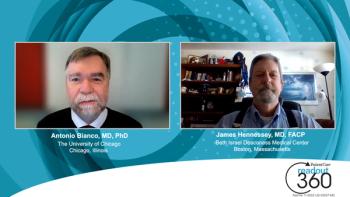
Thyroid Hormone Replacement: An Interim Era
Why not just add T3 to the thyroid hormone replacement mix-as you would with a thyroid extract?
Thyroid hormone replacement (THR) may seem to have been stuck on autopilot for a few generations.
The replacement saga goes something this: administer T4 (levothyroxine), normalize TSH, and everything will be better. But 10% to 15% of people treated in this manner continue to experience “neuro-cognitive” complaints, which suggest ongoing hypothyroidism.1,2
So why not just add T3 to the mix-as you would with a thyroid extract?
A walk through a “hypothyroid memory lane” provides evidence-based answers. There may be some seriously problematic downsides to uninformed T3 replacement strategies.
Let’s frame the issues through both additional T3 administration to baseline T4 and thyroid extracts.
o Thyroid extracts can lead to overdosing in the form of hyperthyroidism with substantial risks in hypothyroid persons who are older and/or who have coronary disease.3 As early as 1978, extract-treated patients have developed abnormally high T3 levels and thyrotoxic symptoms that resolved after switching to levothyroxine.3
o With variable doses of thyroid extract, nervousness, palpitations, and tremor have occurred within 3 hours of ingestion and were accompanied by a 90% increase in T3 levels.3 Going “back to the future,” data such as these led to caveats regarding extracts as far back as the 1980s.3
- 70 patients with hypothyroidism treated for at least 6 months with levothyroxine under-went a prospective, double-blinded, crossover, randomized trial comparing thyroid extract replacement to levothyroxine.4 There was no difference in “neurocognitive” function with either agent, but the extract group “preferred the time they were on extract.”3 Was this preference a sign that adding T3 is better for them? The patients who preferred levothyroxine had the highest T3 values-the opposite of what might be expected!3,4
- The ratio of T4/T3 may be critical to the safety and efficacy of extracts (some say it should be 13-20:1).3 Bovine thyroid extracts have ratios of 9:1 (T4/T3) and porcine 6.6:1.3 There are a lot of extracts out there and unfortunately, there are many variations on the T4/T3 ratio as well. The wrong extract can cause atrial fibrillation or a myocardial infarction.
- Utilizing T3 in a controlled research environment with 3 times daily dosing in an effort to achieve a TSH of between >0.5 to 1.5 u I/U took researchers and their subjects an average of 6 months to reach target.5 This would be a clinical disaster.
Clinical Recommendations to Guide Replacement
1. No recently published guidelines recommend thyroid hormone extracts!3
2. The ratio of T4/T3 in extracts is not consistent with normal thyroid gland output.3 It is a misconception that extracts are more physiologically consistent with normal thyroid function.
3. Be careful with thyroid replacement during pregnancy! Guidelines recommend ONLY thyroxine (T4) for thyroid replacement in gravid women!3
4. Selected guidelines do not recommend the addition of T3 to thyroid hormone outside of clinical trials.3
5. Although some pharmaceutical companies compound formulations of T4/T3 in a myriad of ratios, none are FDA approved.3
The Bottom Line
We are in an important “interim era” of thyroid replacement strategy. Although solo T4 use may not be perfect, the addition of T3 to treatment regimens for hypothyroidism has significant problems and is not recommended at present. Thyroid extracts can be dangerous and should be avoided.
References:
1. Gullo D, Latina A, Frasca F, et al. Levothyroxine monotherapy cannot guarantee euthyroidism in all athyreotic patients. PLoS One. 2011;6:e22552. Doi:10.1371/journal.pone.0022552.
2. Rutecki GW. Is thyroid replacement optimum with levothyroxine? Maybe not for everyone. www.consultant 360.com, April 2016, p.359.
3. Hennessey JV. Historical and current perspective in the use of thyroid extracts for the treatment of hypothyroidism. Endocrine Practice. 2015; 21:1161-1170.
4. Hoang TD, Olsen CH, Mai VQ, et al. Dessicated thyroid extract compared with levothyroxine in the treatment of hypothyroidism: a randomized, double blind, crossover study. J Clin Endocrinol Metab. 2013;98:1982-1990.
5. Celi FS. A much-needed historic perspective on the therapeutic use of thyroid hormones. Endocrine Practice. 2015;21:1171-1174.
Newsletter
Enhance your clinical practice with the Patient Care newsletter, offering the latest evidence-based guidelines, diagnostic insights, and treatment strategies for primary care physicians.

































































































































